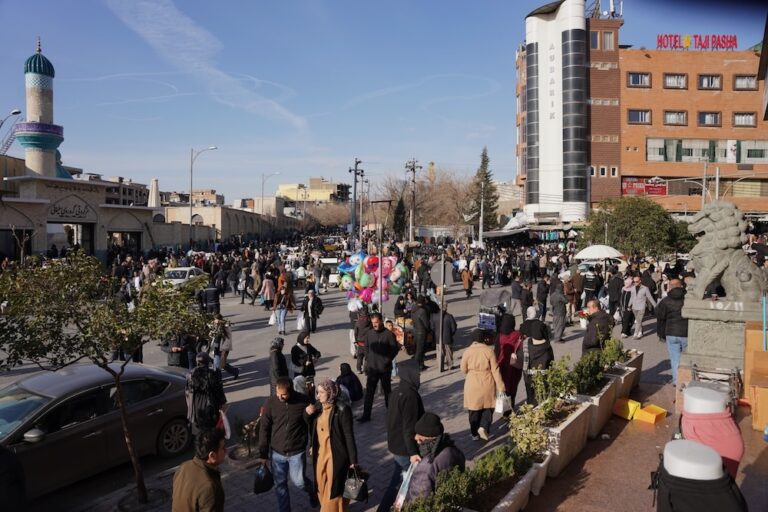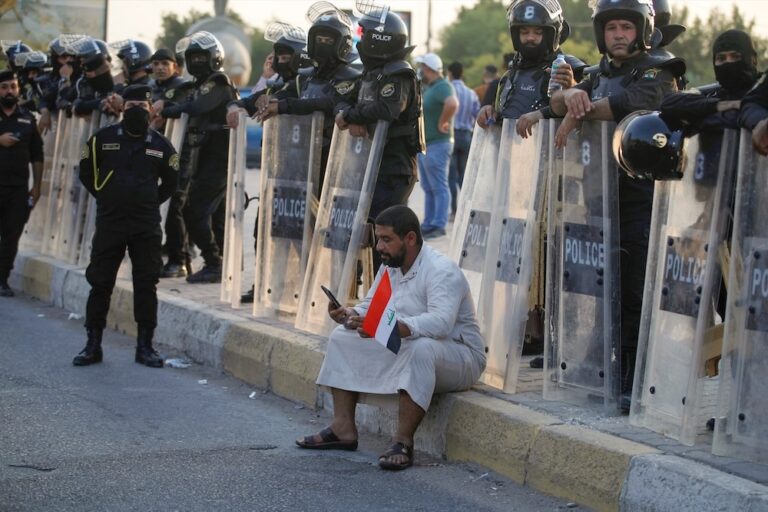An open letter by 44 organisations calls Iraq's proposed Information Technology Crimes law a threat to the fundamental freedoms necessary for the evolution of free speech and a vibrant press. The law will come to vote in the Iraqi Council of Representatives in April.
(ARTICLE 19/IFEX) – The following is an open letter initiated by Access Now and ARTICLE 19 and signed by 44 international organisations regarding Iraq’s proposed Information Technology Crimes law, which has already gone through a first reading in the Iraqi Parliament, and will come to vote in the Iraq Council of Representatives in April:
5 April 2012
To: The Iraqi Council of Representatives
Iraqi Ministry of Communication
Baghdad, Republic of Iraq
iraqimoc (@) iraqimoc.net
cc. Mr. Bahaa Al-A’arajy, Chair
Legal Committee of the Iraqi Parliament (legal (@) parliament.iq)
Iraq has made great efforts to develop the institutions of democracy. However, the proposed Information Technology Crimes legislation poses a significant setback to the fundamental freedoms necessary for the evolution of free speech, a vibrant press, and a robust economy. The proposed legislation puts online actors from nearly every sector, including IT, finance, corporations, the public sector, civil society, and the press, at risk of severe punishment.
The language of the Act is overly vague, overly broad, and overly harsh. The Act has the declared aim of “providing legal protection for the legal use of the computer hardware and the internet.” Its impact, however, is to narrowly define legal behaviors online and empower authorities to restrict unwelcome speech and criticism. It prescribes unduly harsh sentences, including life in prison, for even minor infractions. The terms of the Act offer an invitation for violation of myriad human rights, and are in violation of international treaties to which Iraq is a signatory.
We write to you as representatives of freedom of expression organisations that are concerned about online censorship, surveillance and the protection of freedom of speech. It is in that context that we present to you the analysis of the proposed Act, undertaken by Access Now (Iraq’s Information Technology Crimes Act of 2011: Vague, Overbroad, and Overly Harsh), and ARTICLE 19 (Iraq: Draft Informatics Crimes Law October 2011).
Our analysis exposes the law’s narrow definition of lawful internet and computer use. It finds a pattern of problems, including:
• Vagueness and overbreadth in definitions of crimes: Crimes include violating “religious, moral, family, or social principles or values” or promoting terrorist “ideas.”
• Harsh punishments without proportionality: Life imprisonment is imposed for using computers to “harm the reputation” or affect the “unity” of the country; “deal with the enemy” and expose the country to “dangers”; or publish information about human trafficking, or “mind altering substances” and the like.
• Lack of protection for the press, whistleblowers, and others: Criminal sanctions are imposed for libel and “insults” of others, without exception.
• Uncertainty and lack of privacy for website operators, ISPs, and citizen users: The Act makes ISPs and intermediaries liable, and mandates data be handed over to authorities on request.
• Excessive copyright enforcement: There are no fair use or other exceptions.
We understand that at present, Iraq lacks important legislation about the internet on the issues of e-commerce, intellectual property, identity theft, and data security. However, the rush to address these gaps enables surveillance and censorship, and threatens to set back the economic, political, and social development of the nation.
Whilst we understand governments have an obligation to protect the safety and security of their societies, governments also have an obligation to enable the aspirations and opportunities of their citizens. The proposed legislation creates an environment in which individuals and the private sector alike are bound by uncertainty and the threat of potential punishment, creating a chilling effect on free expression.
As civil society organisations, unconnected to any particular country, government, or religion, we encourage you to reconsider the proposed Act, and we ask that you respect the fundamental rights of your citizens, which is the basis for any true democracy.
Sincerely,
IFEX members:
Access Now, Co-initiator
Bolo Bhi
Electronic Frontier Foundation
Free Press Unlimited
GreenNet
Gulf Centre for Human Rights (GCHR)
Human Rights Foundation
Institute for War & Peace Reporting (IWPR)
Ontornet
Social Media Exchange


